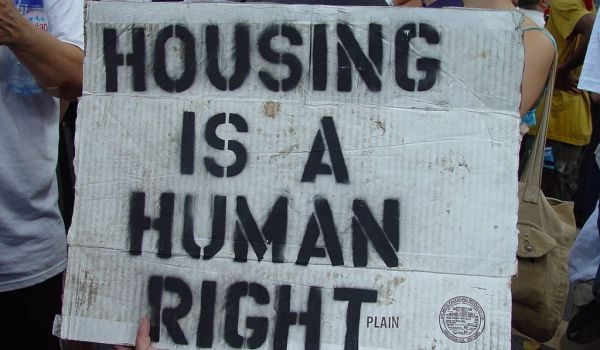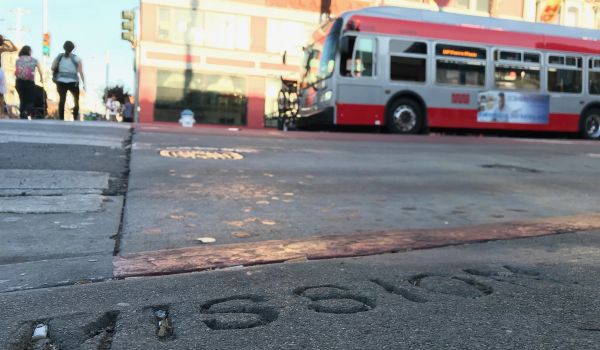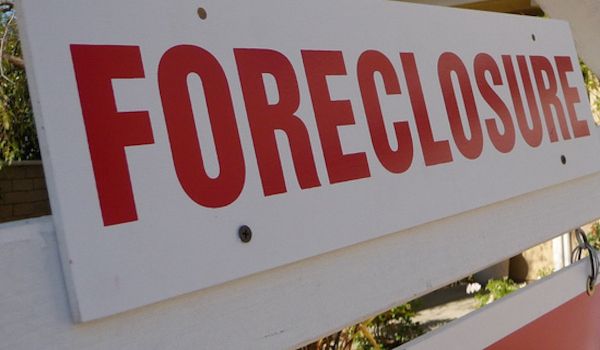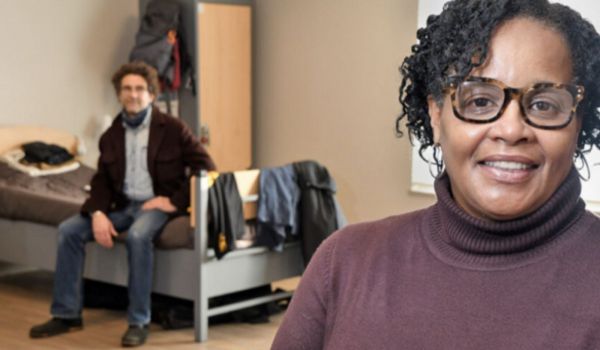On a block on 116th Avenue in Southeast Queens lined with single-family homes, a visibly derelict two-story home sat for years, its windows boarded up. Shrubbery overflowed the front yard; vines climbed up to cover much of what once were living room windows. Another house three blocks away was similarly abandoned, its address scrawled on the front paneling in black spray paint. A few miles further down 116th Avenue, a building had two boarded-up windows on the first floor, and the missing portion of its front wall on the second floor exposed the building’s crumbling innards to the street.
These homes were part of an abandoned program for affordable homeownership initiated by the federal Department of Housing and Urban Development (HUD). The properties were later transferred to NYCHA, NYC’s public housing authority, as rentals. But they fell low on NYCHA’s priority list, and no one has occupied these homes and 10 others like them in Southeast Queens for years.
In 2018, NYCHA invited nonprofits to take the property off their hands. Habitat For Humanity of New York City and Westchester County proposed that they would renovate or completely rebuild the homes, make them energy-efficient and transfer them to a community land trust, where they would remain permanently affordable.
That proposal, called “Habitat Net Zero,” is now breaking ground. The 13 derelict homes will be torn down or rehabbed into 16 permanently affordable homes and transferred into the ownership of Interboro Community Land Trust, which was founded in 2017. Interboro is a nonprofit coordinated by four organizations, including Habitat for NYC and Westchester County, Center for NYC Neighborhoods, Mutual Housing Association of New York and Urban Homesteading Assistance Board. Like most CLTs, they will enter into a lifetime ground lease with homeowners and limit resale value.
Habitat for Humanity International is in the news this week as it is poised to receive a $436 million donation from MacKenzie Scott. “We could not be more excited to get the gift at a time when, in some ways, the state of housing affordability is the worst that it has been in modern times,” Jonathan Reckford, Habitat for Humanity International’s CEO, told The Associated Press. Reckford said Habitat for Humanity will use Scott’s donation of unrestricted funds to increase the supply of affordable housing, especially in communities of color. His group received $25 million from Scott and her husband, Dan Jewett, with the remaining $411 million to be distributed among Habitat’s local affiliates.
In Queens, 13 of the finished 16 units will be new construction and three of the derelict homes will be rehabbed. “Teams of volunteers will be back live and in person. It gives people the opportunity to be back together, swinging their paintbrushes,” says Karen Haycox, CEO of Habitat for Humanity NYC and Westchester County, which oversees the renovations and rebuilds. The history of each home in the program is different, but property records of the homes on 116th Avenue show that they were transferred to NYCHA in 1969, 1970 and 1981. It’s unclear when NYCHA ceased renting them.
The homes will be permanently affordable thanks to a set of subsidies: the city’s Department of Housing Preservation and Development (HPD) will offer funding through a program that finances new construction for owner-occupied homes and restricts resale values to limit speculative purchases. The New State Affordable Housing Corporation, Local Initiatives Support Corporation (LISC) and Nonprofit Finance Fund will provide additional construction funding. The homeowners will also receive an HPD tax break meant for rehabbed affordable housing.
According to Habitat, mortgages will require a 1 percent down payment and will be offered with a 2 percent fixed interest rate over 30 years. Matthew Dunbar, Chief Strategy Officer at Habitat for NYC and Westchester says this low-interest loan was only possible because of a partnership with the State of New York Mortgage Agency (SONYMA) and New York State Homes and Community Renewal. Future properties offered by Interboro will likely be Fannie or Freddie-backed loans or SONYMA mortgages, Dunbar says.
Resale value of the homes will be limited to the sale price plus a compounding 2 percent of that price every year. Dunbar says this rate, which will remain the same for the length of the 99-year ground lease with the homeowners, was chosen based on conversations with other community land trusts across the country, including Grounded Solutions Network, which provides support to CLTs. The goal was to select an interest rate that could provide resale value to the homeowner, allowing them to build equity without destabilizing the neighborhoods or opening the homes up to speculation.
“Having a set percentage is the most predictable way to calculate resale formulas, so the homeowner can know what the resale price is over time,” Dunbar says. While some HDFC Co-Ops, which also typically have covenants restricting resale value, choose to tether those values to inflation, Dunbar says this can be unpredictable. While a fixed interest rate creates the risk that homes will sell for less than their purchase price due to runaway inflation, Dunbar says this is unlikely and the program’s built-in subsidies would offset this.
Structural repairs made to the property will also raise the maximum resale value, and Interboro uses a chart that measures how much resale value can be added depending on the type of renovation. In addition to the Article XI tax exemption available to all homeowners in community land trusts, prospective buyers will be eligible for down payment assistance.
The homes will be offered to qualified applicants based on a housing lottery, with the first 25 percent of applicants pooled from current NYCHA residents and another 50 percent from households who live in the local community board district. To be eligible, buyers will have make 60 to 80 percent of the area median income, or between $64,440 and 85,920 for a family of three.
The homes are designed with solar panels and heat pumps to be energy-efficient, with a 75 percent reduction in overall energy use, driven by a 90 percent reduction in energy use for heating and cooling.
New homeowners will be able to join Interboro’s advisory board and will help determine regulatory changes or income requirements for the CLT. There’s no way to know who the homeowners will be, but Haycox says most of the people who purchase their new affordable homes are single female heads of household.
Per the Habitat model, volunteers will construct some of these buildings. Homeowners will also be able to help with construction in exchange for credit on their mortgage, something Habitat calls “sweat equity.” The organization will do a full homeownership curriculum with homeowners to understand their rights and responsibilities, Haycox says.
New York State has historically had low homeownership rates compared with the rest of the nation — 53 percent last year, compared with 64 percent nationwide. In NYC, that rate is 31.9 percent, as most residential units are rental housing. That rate is lower for Black and Hispanic NYC residents, whose homeownership rates are 26.6 percent and 15.9 percent respectively, compared with above 40 percent for White and Asian households. Southeast Queens, where all the Habitat Net Zero homes have sat for decades, is known for a civically-engaged community of middle-class Black homeowners, and both the current mayor and city council speaker hail from the neighborhood.
In December, Governor Hochul signed legislation that seeks to increase homeownership among lower-income families, raising the state’s subsidy for building or preserving permanently affordable housing from $40,000 to $75,000 per dwelling unit.
“We’re starting to talk more as a sector and society about addressing decades, centuries of unjust racial housing policy,” Haycox says, “poor lending that highly favorited White communities and didn’t provide access to communities of color.”
Finding the balance between promoting homeownership without exacerbating the divides between renters and owners can be difficult. Still, social housing that puts land and homes in government or nonprofit hands and restricts resale value can help build equity while limiting speculation, which hurts both renters and lower-income aspiring homeowners.
Several pieces of pending legislation could potentially change NYC’s community land trust ecosystem. At the state level, State Senator Brian Kavanagh introduced a bill that would create a $50 million acquisition fund for community land trusts, while the NYC City Council introduced another bill called the Community Opportunity To Purchase Act (COPA) that would give nonprofits right of first refusal when a building comes up for sale.
Dunbar says these actions together would meaningfully allow CLTs like Interboro to expand their portfolio. “I think it would provide an increased pipeline for Interboro Community Land Trust and other community land trusts,” he said of COPA. “The opportunity to purchase is one aspect, but it really does need to be paired with funding.”
This article is part of Backyard, a newsletter exploring scalable solutions to make housing fairer, more affordable and more environmentally sustainable. Subscribe to our weekly Backyard newsletter.

Roshan Abraham is Next City's housing correspondent and a former Equitable Cities fellow. He is based in Queens. Follow him on Twitter at @roshantone.



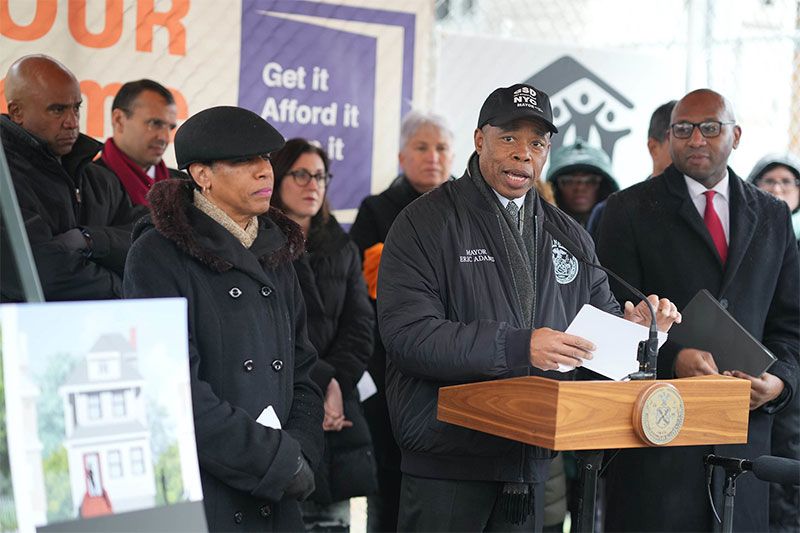
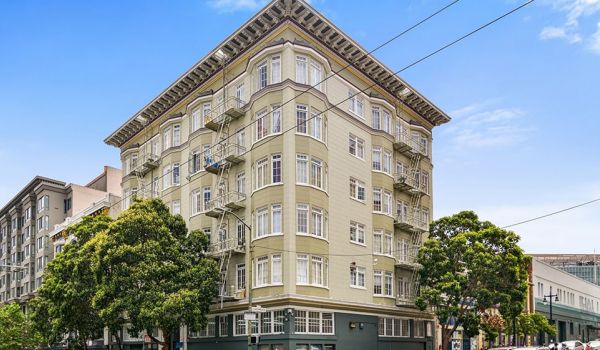
_920_614_600_350_80_s_c1.jpg)
_600_350_80_s_c1.JPG)

